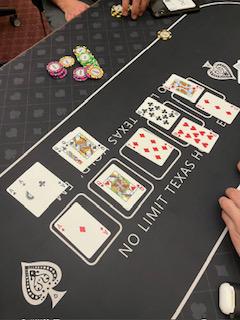For this week’s critical play I played poker with my dorm friends. Many of my friends play poker every week (and I occasionally join them), but playing after having read the Addition by Design article brought a new dimension to my experience. We played with actual cards, and although no one knows who created poker, it is said that variants of the game have been around at least since the 1800s. The target audience for the game are those who enjoy games of chance, but they could range from very casual players that play for fun, to competitive professional players that play the game as a (stressful) career.
Playing poker was a great way to spend my Friday night, however one must recognize the huge amount of risk that is associated with the game. One of the main

differences between poker and
other games of chance is the attribution to math and psychology as part of the game. While some games such as roulette are purely luck, poker has the (dangerous) ability to have players outplay their opponents. For example, in our table, people have played together for over an year, so the history of how each player plays, and the knowledge that they have about certain probabilities makes the more experienced players often win more in the long run. But perhaps, I would argue that this design mechanic of the game makes it potentially more dangerous than other games of chance. This is because the use of math and “reading bluffs” can give players the illusion that they are in control of odds. But, just as it was pointed out in Randy’s lecture, it doesn’t mean that if something only happens 1/10 of the time, it will never happen. This was actually an great epic fail during my session, where a highly unlikely event ocucred to the amazement of everyone.
Personally, I felt that the game was most dangerous when I got a really good hand. This is because the fact that good hands are so rare made me extremely excited to play and have a good one. In this way, the game plays with probabilities so that you wait for hours for a good hand (and probably lose a lot of money). It’s very interesting how these probabilities end up being intertwined with types of fun, since part of the fun of Poker for me is Submission: just spending time with my friends socializing!



